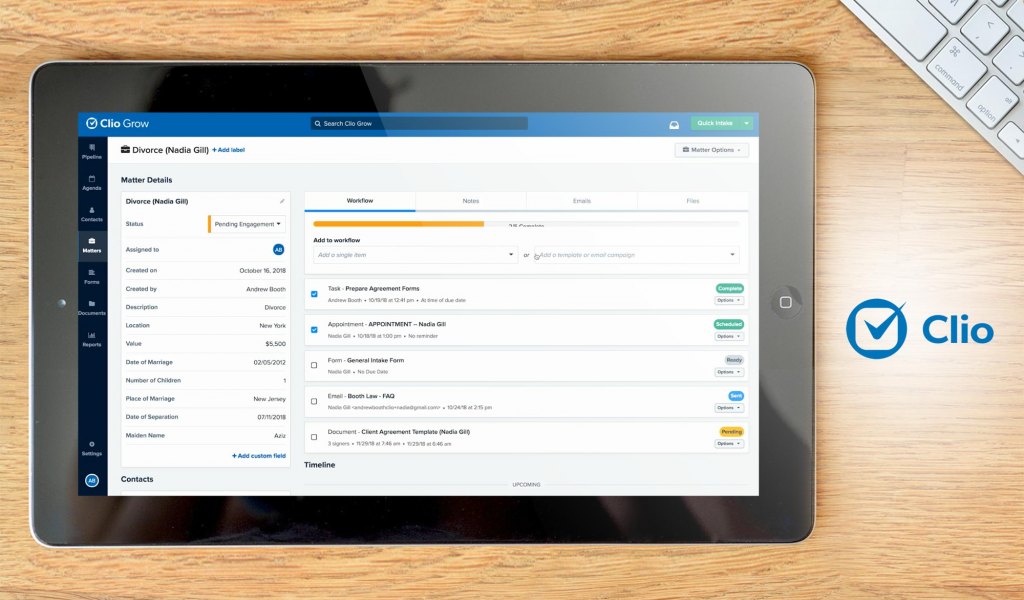Legal professionals such as lawyers and paralegals often deal with mountains of documents and files for each case they handle. One way to ensure proper storage and accessibility of these documents is through the use of case management software. Using these tools, legal professionals build a secure, accessible repository for all essential case-related documents and notes. In many cases, case management systems also help lawyers and paralegals track billable time and make notes on client profiles and cases, improving their productivity.
This article aims to serve as a guide to what is case management software and how it works. The sections below also explore the software’s features, benefits, and costs, along with examples of these tools.

What Is Case Management Software Table of Contents
What is case management software?
Case management software comprises tools for storing important case-related documents and notes. Aside from storing these documents, the system also serves as a centralized repository of the documents and files legal professionals need for their daily work. The software sees regular use in law offices and law firms, especially those that handle a high volume of cases and clients.
In addition, case management tools often come with features that help legal professionals track billable time, create notes, and organize and manage calendar appointments. When you search for “what is legal case management software,” you’ll find that many case management systems serve as companion tools for larger law practice management software.
As the justice system itself starts to modernize, more law firms and lawyers have started to adopt case management systems and other legal technologies for workflows such as e-signature requests, legal research, and records management. These software help improve legal professionals’ overall productivity.
Most Commonly Used Legal Tech Tools
Billing: 79
Billing
%Legal research: 70
Legal research
%E-signatures: 69
E-signatures
%Timekeeping: 63
Timekeeping
%Cloud storage: 62
Cloud storage
%Records management: 59
Records management
%Matter management: 53
Matter management
%Source: Bloomberg Law's Legal Operations & Technology Survey 2022
Designed byTypes of Case Management Software
There are various types of case management tools in the market today. For instance, these tools can be categorized into their deployment features:
- On-premise case management systems. These are installed on computers or servers at your office’s location. While this may sound more convenient, it also means handling upgrades yourself and dealing with higher upfront licensing costs.
- Cloud-based case management solutions. These tools are hosted on the cloud and often offer a subscription model for their pricing. Such tools often enable hassle-free upgrades and easier scalability.
You may also find different types of case management software based on their functions: generic case management software and practice-focused case management software.
- Traditional case management platforms. These come in handy for law firms that just want a software to streamline storage of case-related files and documents. Such software solutions are a better fit for law firms that practice different types of law.
- Practice-focused case management tools. Meanwhile, practice-focused case management tools offer special features to meet the specific requirements of the law firm’s practice areas. For instance, you may find case management tools that are specially designed for personal injury, criminal law, tax law, and other legal practice areas.
You may also encounter case management software for small and medium law firms, as well as comprehensive case management tools designed for larger law offices. These software often vary in the number of features they offer.

Zola Suite provides a centralized dashboard for viewing case-related emails, calendars, and tasks.
Features of Case Management Software
You’ll find many tools and systems on your search for “what is case management software,” but these software has various features in common. Below are some important features to expect from these tools:
- Centralized file repository. As mentioned, case management systems serve as centralized locations for vital case-related files. Aside from safe storage, these software also offer search functionalities and data import/export functions to help users find the information they want.
- Document management. These tools allow users to upload a wide range of client-specific and case-related documents. In most cases, users will be able to upload relevant file attachments, email correspondence, and client contact information.
- Time tracking and expense tracking. This feature makes it easier for legal professionals to track their hours and expenses more accurately. Most case management software allow users to track billable time on an hourly, transactional, or other user-defined basis.
- Billing and invoicing. Many of these tools offer built-in features for generating invoices based on tracked billable hours and expenses. Meanwhile, other case management software seamlessly integrate with invoicing software to reduce manual data entry errors.
- Task management. Aside from storing case documents and notes, the software lets users manage daily to-do lists and tasks and track the progress of these tasks. Managers get the ability to assign tasks to specific staff members and monitor the time spent on completing tasks.
- Calendar management. Many case management tools offer calendar management capabilities, allowing users to schedule and organize appointments with clients and other important case-related events.
- Client portal. For easier access to case data, many case management software let users set up a client portal. Through this portal, clients can more easily access and share case-related documents and collaborate with legal professionals when needed.
Benefits of Case Management Software
Case management tools and other legal technology have made a considerable impact on how legal professionals work. For instance, like the best law practice management systems, case management platforms help improve productivity and facilitate easier collaboration. Below are the main benefits offered by these tools:
Data security
This is one of the most important benefits of using case management tools. These platforms provide protection for the sensitive information of clients and cases through features such as user authentication, data encryption, and auto-backups. Some software also allow users to set up user roles to restrict access to certain files. With all these features, the software keeps data safe from unauthorized access and cyberattacks.
Improved quality of service
By automating workflows for document management, note-taking, and time-tracking, these tools free up legal professionals’ time for more important tasks. As a result, lawyers and paralegals can focus on improving the quality of service they provide clients. This can go a long way in improving a law firm’s bottom line.
Easier communication with clients
Case management software facilitates easier communication between legal professionals and clients through features such as the client portal. These portals typically allow clients to directly communicate with the lawyers handling their cases. As a result, law firms can avoid issues such as miscommunication and foster trust in their clients.
Improved efficiency and organization
Law firms stand to lose billable hours when case-related documents are inefficiently organized, especially since legal professionals have to deal with high volumes of such documents. By collecting all such documents and organizing them in central location, case management software ensures that legal professionals can easily pull up the documents they need. This can also help lawyers become more efficient at analyzing case details, making it easier for them to build a solid case for their clients.
Increased productivity
The software helps improve users’ productivity, thanks to features such as to-do lists and daily tasks. Through these features, legal professionals can ensure they stick to deadlines and that important tasks don’t get overlooked.
Accurate tracking for billable hours and expenses
Many such software come with built-in tools for tracking lawyers’ billable hours and expenses, helping lawyers save time. These accurate tracking features ensure that law firms always get paid their dues. For added convenience, many case management tools accept direct payments from clients.
Smoother collaboration
With many law firms still offering remote work options, case management tools can prove to be invaluable. These tools can help legal professionals collaborate efficiently even when working remotely, ensuring that remote employees can access the files they need wherever they’re working.
Examples of Case Management Software
Zola Suite
Also a legal practice management platform, Zola Suite is our top pick for case management software today. The platform allows legal professionals to securely store case-related files on one platform while capturing important client information such as personal details and meeting schedules. Moreover, Zola Suite offers robust billing and trust accounting features, allowing users to create professional-looking invoices right from the platform.
Bilr
Bilr works as a legal billing and case management software that automates time-tracking and billing workflows for law firms and law offices. The software offers advanced features to help users to track time more accurately. These features include voice-enabled time tracking, auto-review billing, and concurrent billing timers. The platform also provides in-depth data analytics on key metrics such as lawyer performance and overall billing performance.
PracticePanther
An intuitive case management tool, PracticePanther makes the daily tasks of legal practice as easy as possible for lawyers and paralegals. For instance, one of the most useful features of the platform is that it comes with a secure mobile app, which helps lawyers record billable time and expenses on the go. The platform allows users to automate common workflows such as client intake and onboarding, reducing the risk of costly errors.
Clio
Clio is a comprehensive legal software that combines key functions such as case management, calendaring, task management, and billing and accounting. Through Clio, lawyers can log onto a single dashboard to access all essential features and become more productive. Client portals improve communications among colleagues and clients without compromising sensitive case information.
TimeSolv
Designed for law firms of all sizes, TimeSolv helps streamline case management workflows by improving the accuracy of time tracking and billing. The platform allows users to track time from any device, even offline, and even run multiple timers when needed. The recorded data is used to ensure that law firms send accurate invoices, while integrated payment processing provides clients with an easy way to make payments.

PracticePanther makes it easy to view the status of assigned tasks as well as task details such as assignees.
Cost of Case Management Software
Vendors often use different pricing schemes for case management software. Their pricing vary depending on the number of expected users. For instance, Bilr pricing ranges from $29 per user per month for one user to $20 per user per month for 50 users.
Meanwhile, other case management software offer tiered pricing. You can view some examples of current pricing schemes for case management systems below.
- Bill4Time. This platform is available in three pricing plans—Legal Solo ($30 per month), Legal Pro ($50 per month), and Legal Enterprise ($100 per month)—each with its own set of features. A free trial is available.
- MyCase. Meanwhile, MyCase offers tier-based pricing that varies with the number of expected users. The platform offers three paid plans: Basic ($39 per month per user), Pro ($59 per month per user), and Advanced ($79 per user per month).
- ActionStep. On the other hand, ActionStep offers only one paid plan for interested users. The plan costs $60 per user per month and is available for a free trial.
- Rocket Matter. RocketMatter is available by custom pricing, so interested users must contact the vendor to get more detailed pricing information and a quote.
Case Management Software Buying Factors
With the multitude of case management tools available on the market today, it can be confusing to figure out which software makes for the best choice for your organization. Consider the following buying factors as you’re making your choice among the available case management software today.
Mobile accessibility
As working remotely becomes more common among legal professionals today, it’s crucial for case management solutions to be accessible from mobile devices. Such feature ensures that lawyers can retrieve case data, sign documents, and communicate with clients on the go. The good news is that many leading case management tools also offer native mobile apps. Others ensure that dashboards are accessible through web browsers. These features are crucial if on-the-go work is common among your organization’s lawyers.
Integrations with existing software ecosystems
Case management tools work best when they seamlessly integrate with the other business tools your organization uses. For instance, the software must be able to integrate with tools for customer relationship management, billing and accounting, calendaring, and even email. These integrations ensure that legal professionals get complete visibility into the cases they handle.
Deployment options
Basically, you have two deployment options to choose from: on-premise and cloud-based. Go for an on-premise case management system if you want full control over where data is stored and you’re ready to make an investment in IT infrastructure, maintenance, and support. If you don’t want to deal with the maintenance requirements of on-premise deployment, you can choose cloud-based case management tools. Cloud-based platforms also typically offer easier scalability.
Available support and training
Adopting new technology often takes time, especially when training and onboarding employees. This is why it’s important to consider the training and support offered by case management software vendors. Consider if training and support are provided in person or online and if resources are available 24/7.
Case Management Software Trends
Like many types of technology and software, legal technology like case management tools continue to evolve. Below are some important trends surfacing in case management software and legal tech.
- Automation. With this trend, more case management systems are offering features for automating routine administrative work, like sending and processing client intake forms and onboarding clients. These features help legal professionals save a significant amount of time.
- Artificial intelligence. AI technology also powers case management systems in making routine tasks more efficient. Through the technology, lawyers can avoid wasting time on repetitive tasks and even use AI-powered insights for revising documents more quickly.
- Cybersecurity. As more clients become more knowledgeable and grow more worried about cybersecurity, more case management solutions and legal software are offering robust cybersecurity features to support law firms. These features include automated back-ups, continuous monitoring for vulnerabilities, and security protocols such as two-factor authentication.

Case status is easy to view and manage, as seen on Clio’s dashboard.
Potential Issues with Case Management Software
Despite the benefits they bring, case management software may also bring with it some challenges, especially when it comes to adoption. For instance, the Bloomberg Law’s Legal Operations and Technology Survey 2022 found that the biggest barrier to legal tech usage is the lack of tech savvy individuals among users. This is why it’s important to choose a case management tool that offers sufficient support through multiple channels like email, phone, and tickets. Such software makes employee training and onboarding easier so software adoption becomes faster as well.
Integration problems could also be a barrier to adopting case management systems. Without proper integrations in your software ecosystem, you get an incomplete picture of your organization’s workflows and case workload. For instance, to ensure a smoother billing or invoicing workflow, case management systems must seamlessly integrate with third-party tools for billing and accounting. You can avoid integration issues by doing extensive research into the capabilities of the software on your shortlist.
When to Get Case Management Software for Your Firm
More law firms are adopting legal technology in the form of case management and legal practice management tools. If you expect your organization to handle a growing volume of case-related documents and files, then legal case management software may be worth considering.
What’s important is that you extensively research the software you’re considering adopting. This not only ensures that you find a solution that offers the features your organization needs but also helps you make the right investment in legal tech for your organization. You can start with Zola Suite for its robust features, then try comparing other popular law practice management software with it.


























Leave a comment!